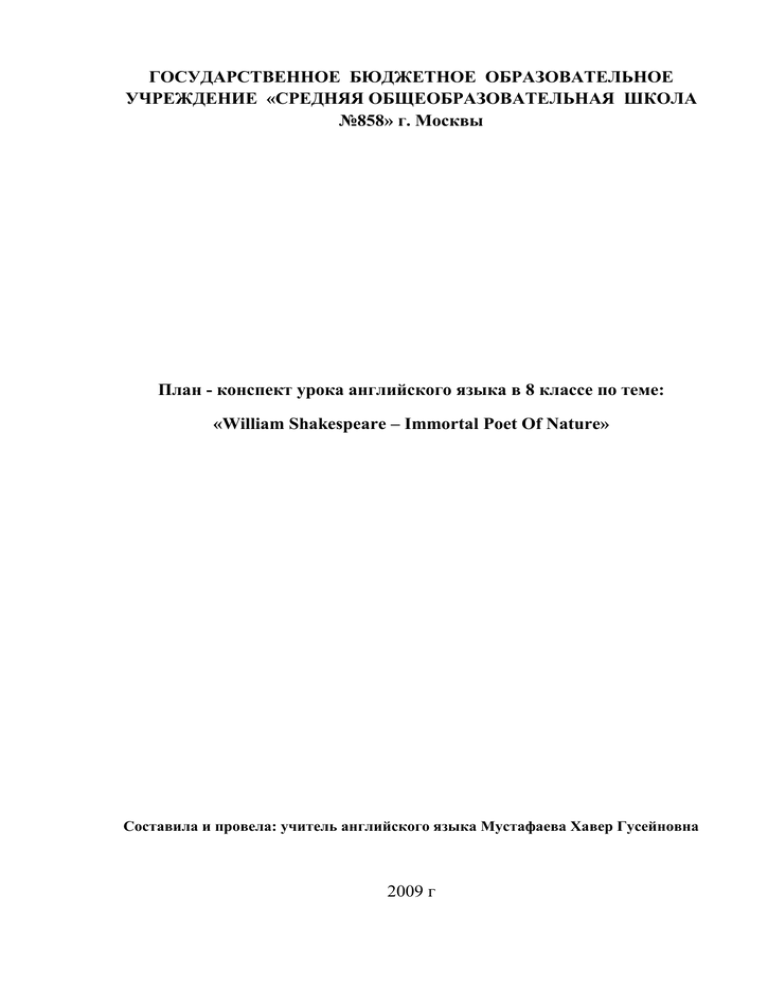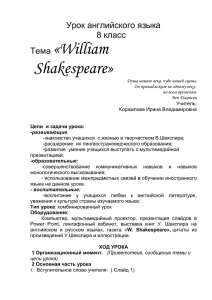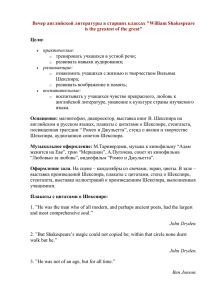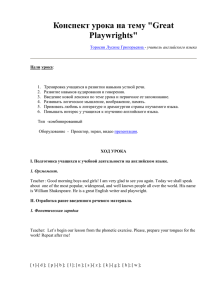William Shakespeare (печать)
реклама

ГОСУДАРСТВЕННОЕ БЮДЖЕТНОЕ ОБРАЗОВАТЕЛЬНОЕ УЧРЕЖДЕНИЕ «СРЕДНЯЯ ОБЩЕОБРАЗОВАТЕЛЬНАЯ ШКОЛА №858» г. Москвы План - конспект урока английского языка в 8 классе по теме: «William Shakespeare – Immortal Poet Of Nature» Составила и провела: учитель английского языка Мустафаева Хавер Гусейновна 2009 г Тема урока: «William Shakespeare – Immortal poet of Nature» Задачи: 1. Развитие навыков говорения, аудирования в процессе творческого общения учеников друг с другом и учителем на основе изучаемой темы; 2. Ознакомить учащихся с жизнью и творчеством Шекспира. Развитие интереса учащихся к культурному наследию Великобритании, расширение кругозора по теме.. Наглядность: стенгазета “Our National Bard”, портрет поэта, картины мест, где он жил, работал. Оснащение: проектор, раздаточный материал, компьютер, магнитофон, выставка книг В. Шекспира на английском и русском языках, аудиозаписи сонетов Шекспира. 3. Воспитать у учащихся уважение к окружающим и прививать интерес к изучению английского языка. План урока I. Приветствие Вступительное слово учителя. Teacher: Good afternoon everybody! I’m glad to see you. Is everything OK? Let’s begin our lesson. Our topic is dedicated to the greatest playwright in world literature: William Shakespeare. I hope all of you will take an active part in it. It is impossible to speak about the English literature without speaking about this poet. II. Речевая зарядка Answer the questions: Where was W. Shakespeare from? Is he famous for only in England? Which river is associated with name of W. Shakespeare? Did he write only historical plays? W. Shakespeare was a great playwright, wasn’t he? Where did he stage his plays? Did he write in golden age of English Renaissance? III. Работа с лексикой. Immortal – бессмертный doubtful – сомнительный suspect – подозревать, заподозрить associate – ассоциировать extract - отрывок account – счет, отчет playwright – драматург renaissance – возрождение IV. Сообщение учащихся о жизни и творчестве Шекспира. P1: William Shakespeare was born on April 23, 1564 in Stratford-on-Avon. He probably attended the local grammar school. William left the Grammar school when he was 13 and never went to school again. His father was a dealer in corn, meat, wool. William’s mother was a daughter of a rich farmer in the village of Wilmcote. P2: The name of William Shakespeare is known all over the world. The last half of the 16th and the beginning of the 17th centuries are known as the Golden Age of English Renaissance and sometimes are called “The Age of Shakespeare”. P3: People often call Shakespeare “Our National Bard”, “The immortal Poet of Nature”. We really know few facts of his life and many of them are doubtful. P4: We also know that, being 18 years old, William married Anne Hathaway, who was 9 years older that himself. They had a daughter Susanna daughter and twins – son Hamnet and daughter Judith. P5: In the 1587 Shakespeare left Stratford-on-Avon for London to find a job, where he began writing plays staged at the Globe Theatre. By 1592, he had been an important member of a well-known acting company. P6: It is known that only in 1611, at the height of his fame, Shakespeare returned to Stratford, where in April 23, 1616 he died. He was buried in a fine old church in Stratford (Holy Trinity Church). V. VI. Relaxing (музыкальная пауза) Вопросы к учащимся Teacher: You have mentioned the main facts Shakespeare’s biography. Now I’d like youг agree or disagree with some facts from Shakespeare’s life. Shakespeare was born in 16th century. Yes, it’s true. He attended the local grammar school in Stratford. Yes, it’s true. He got married when he was 20. His wife was 5 years older than himself. It’s false. He got married when he was 18. His wife was 9 years older than himself. Shakespeare wrote 45 plays, 150 sonnets, 3 poems. It’s false, in all Shakespeare wrote 37 plays, 2 long poems and a sonnet cycle of 155 small pieces. Shakespeare died in London and was buried in Westminster Abbey. It’s false. He died in Stratford-on-Avon and was buried in the Holy Trinity Church in Stratford. Shakespeare never acted on the stage. It’s false. William acted his plays himself. Teacher: Thank you for your answers. I see that you know Shakespeare’s life rather well. VII. Беседа о произведениях В. Шекспира. Teacher: As you know in London Shakespeare became an actor of the Globe Theatre and began to write plays for it. Name some of them please. P1: Shakespeare’s work as a playwright is subdivided into 3 periods. In the first period Shakespeare’s plays are mostly history plays like “Henry VI”, “King John”, “Richard II”, “Richard III”. P2: Written in the second period, Shakespeare wrote a number of comedies like “The Comedy of Errors”, “All’s Well that Ends Well”, “Twelfth Night” etc. P3: In the third period after 1600, appeared his major tragedies like “Hamlet. Prince of Denmark", “Othello”, “King Lear”, “Macbeth”. Types of plays VIII. Аудирование T: You are going to listen to an extract from a famous play. Do you remember it’s name? Who is the main character? Учащиеся читают отрывок из «Гамлета» на английском и русском языках. To be, or not to be: that is the question: Whether 'tis nobler in the mind to suffer The slings and arrows of outrageous fortune, Or to take arms against a sea of troubles, And by opposing end them? To die: to sleep; No more; and by a sleep to say we end The heart-ache and the thousand natural shocks That flesh is heir to, 'tis a consummation Devoutly to be wish'd. To die, to sleep; Быть иль не быть, вот в чем вопрос. Достойно ль Души терпеть удары и щелчки Обидчицы судьбы иль лучше встретить С оружьем море бед и положить Конец волненьям? Умереть. Забыться. И все. И знать, что этот сон - предел Сердечных мук и тысячи лишений, Присущих телу. Это ли не цель Желанная? Скончаться. Сном забыться. Уснуть. (пер. пер.Борис Пастернак) IX. Работа с известными выражениями из произведений Шекспира T: “To be or not to be, that’s the question” This expression is known to every body, but there are a lot of other famous expressions from Shakespeare’s plays. Translate some of them: 1. To win golden opinions – Заслужить благоприятное мнение. 2. There’s the rub – Вот в чем загвоздка 3. The whirling of time – Превратности судьи 4. The beginning at the end – Начало конца 5. All is well that ends well – Все хорошо, что хорошо кончается X. Чтение сонетов Шекспира. Shakespeare wrote many sonnets (154). They are very popular anв loved by our people. All of them were translated into different languages. Listen to some of them. (Ученики читают любимые сонеты Шекспира). P1: To me, fair friend, you never can be old, For as you were when first your eye I eyed, Such seems your beauty still. Three winters cold Have from the forests shook three summers' pride, Three beauteous springs to yellow autumn turn'd In process of the seasons have I seen, Three April perfumes in three hot Junes burn'd, Since first I saw you fresh, which yet are green. P2: Ah! yet doth beauty, like a dial-hand, Steal from his figure and no pace perceived; So your sweet hue, which methinks still doth stand, Hath motion and mine eye may be deceived: For fear of which, hear this, thou age unbred; Ere you were born was beauty's summer dead. Ты не меняешься с теченьем лет. Такой же ты была, когда впервые Тебя я встретил. Три зимы седые Трех пышных лет запорошили след. Три нежные весны сменили цвет На сочный плод и листья огневые, И трижды лес был осенью раздет… А над тобой не властвуют стихии. На циферблате, указав нам час, Покинув цифру, стрелка золотая Чуть движется невидимо для глаз, Так на тебе я лет не замечаю. И если уж закат необходим, Он был перед рождением твоим! (Перевод С.Маршака) Sonnet 18 P3: Shall I compare thee to a summer's day? Thou art more lovely and more temperate: Rough winds do shake the darling buds of May, And summer's lease hath all too short a date: Sometime too hot the eye of heaven shines, And often is his gold complexion dimm'd; And every fair from fair sometime declines, By chance or nature's changing course untrimm'd; But thy eternal summer shall not fade Nor lose possession of that fair thou owest; Nor shall Death brag thou wander'st in his shade, When in eternal lines to time thou growest: So long as men can breathe or eyes can see, So long lives this and this gives life to thee (ПЕРЕВОД Н. ГЕРБЕЛЯ) P4: Как я сравню тебя с роскошным летним днем, Когда ты во сто раз прекрасней, друг прекрасный? То нежные листки срывает вихрь ненастный И лето за весной спешит своим путем; То солнце средь небес сияет слишком жарко, То облако ему туманит ясный зрак — И все, что вкруг манит, становится неярко Иль по закону злой природы, или так — Случайно; но твое все ж не увянет лето И не утратит то, чему нельзя не быть, А смерть не скажет, что все в тень в тебе одето, Когда в стихах моих ты вечно будешь жить. И так, пока дышать и видеть люди будут, Они, твердя мой гимн, тебя не позабудут. XI. Разгадывание кроссворда (Crossword) T: How well do you know Shakespeare’s characters? Ten Shakespeare’s characters are hidden in this word square. Can you find them? We ask you to divide into two teams(Group work). Start working , please .(Good Luck!) H R I C H A R D S D O A Z J A G O O P E J M M U L Q M O E S O A A L I E E O A D T N U I E N A R K E H O S E S T N R O M E T E T T I I O U O L H T E B C A M T N L A L E O J R E M A O M O I T A R O H K XII. Подведение итогов урока (Рефлексия) Dear friends, thank you for the lesson. You have taken an active part at our lesson. We have learnt to some facts from William Shakespeare’s biography and the time when he lived and worked. You get today only good marks. You’ll remember our lesson for a long time. One quotation from Ben Johnson:” Shakespeare was not an age, but for all time”. XIII. Прослушивание Сонета Шекспира в исполнении Микаэла Тарывердиева. At the end of our lesson I would like you to listen the song “Love” by Mikael Tariverdiev (стихи В. Шекспира). The lesson is over. Good-bye.



